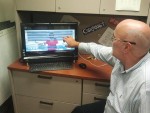Professor builds self-health management game

While many professors conduct their research by working in labs or classrooms, one professor in the College of Nursing made a game of his research – literally.
To better help and empower those with chronic illnesses, USF professor John Clochesy created an electronic self-management resource training (eSMART) computer program that patients can play to help manage their symptoms.
“It helps them approach their experience in a new way,” Clochesy said. “They can experience it with this new framework where they can perceive it differently and manage it differently.”
After speaking with focus groups about how they manage their illnesses and deal with problems they experience at the doctor’s office, Clochesy and a team of researchers worked with engineers to develop a computer game that simulates an appointment with a physician, which can aid patients with symptoms and practice for real-life appointments.
“The game teaches people to keep track of the symptoms they are experiencing and bring that information with them, because lots of times you go to the doctor and say ‘I’m feeling fine now,’ but last week you were feeling certain symptoms,” Clochesy said.
Clochesy worked with researchers to develop the original game, Electronic Self-Management Resource Training Reduce Health Disparities (eSMART-HD), and an adapted version for patients with mental health disorders, Electronic Self-Management Resource Training for Mental Health (eSMART-MH).
While the original version is designed for older audiences with illnesses such as diabetes, lung disease, high blood pressure, depression or anxiety, eSMART-MH is designed for young adults and has shown to significantly decrease symptoms of depression.
“We found we can actually reduce symptoms of depression using the game,” Clochesy said. “…We think that some of the experience helps people realize they aren’t the only one that feels this way. Obviously if it is in the script, it’s not unique and there must be others since it shows what you are thinking or feeling.”
The computer program walks users through a visit to the doctor’s office, going from talking to the receptionist, to meeting a virtual doctor. Throughout the process, the user is coached to share more about the symptoms they are experiencing, ask for information from the doctor and repeat and reflect on strategies best suited for the patient.
For many patients, the game teaches them how to manage and document their symptoms on a notepad or phone so patients can share with doctors.
“If you experience things and manage it well in a practice setting, it’s more likely when it comes up, you’ll do it… much like a fire drill with students,” Clochesy said.
While the game is not yet commercially available, Clochesy said he and his team are more concerned with improving the program to better help patients, with plans to include patients who may be blind or for veterans who may suffer from post-traumatic stress disorder (PTSD).
More information, and a downloadable version of the eSMART-HD program can be found at health.usf.edu/nursing/esmart.







